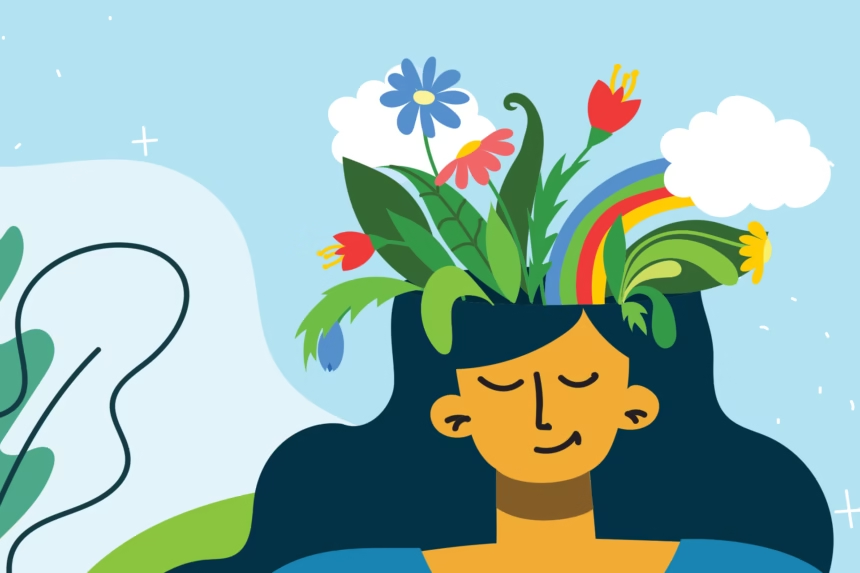Life in 2025 feels loud. Screens ping, news cycles bite, and pressure stacks up before breakfast. You do not need a full reset to feel better. You need a few mental health tips 2025 that fit into real days.
This guide is short, clear, and practical. Small daily actions beat big one-off changes. You will learn a calm morning start, quick stress resets, steadier sleep, kinder self-talk, stronger connections, and easy ways to make it all stick. Pick two habits to start today and keep it simple.
Mental health tips 2025: build a simple daily routine that lasts
Routines help your brain save energy. When the rhythm is set, you think less about what to do next, and you feel lighter. Keep steps tiny and repeatable. You want wins, not willpower battles.
- Same wake window most days. A 30-minute range is fine.
- Anchor basics to daily cues, like kettle boils or lunch breaks.
- Swap, do not stop. Replace doomscroll with a 5-minute stretch or breath.
- Consistency beats perfection. Miss a day, then return the next.
A sample 10-minute morning plan:
- Two minutes: write three things you are grateful for.
- Five minutes: slow breathing, box or 4-7-8.
- One minute: open curtains and stand in daylight.
- Two minutes: sip water, plan one key task.
A short evening wind-down:
- Five minutes: light stretch and a warm drink.
- Four minutes: set tomorrow’s top task on a sticky note.
- One minute: dim the lights and put your phone away.
Start your morning calm: gratitude, breath, and sunlight
Use this 5 to 10 minute start:
- Write three things you are grateful for. Keep it plain. A warm cup, a kind text, a sunny window.
- Do five minutes of slow breathing. Box, four in, hold four, out four, hold four. Or use 4-7-8 if you prefer.
- Get 5 to 10 minutes of daylight on your eyes. It sets your body clock and lifts your mood.
- Delay your phone for 30 minutes if you can. Let your brain wake up first.
Why it works: gratitude nudges your attention toward what helps, not what hurts. Morning light tells your body when to be alert, which also improves sleep at night.
A one-line wake-up script: “Today I will start small and be kind to myself.”
Move in short bursts to boost mood all day
Motion acts like a reset button. You do not need a long workout to get the lift.
Try three mini moves:
- A 10-minute walk. Outside if possible.
- Stretch every hour. Neck rolls, shoulder circles, calf stretch.
- Ten bodyweight reps. Squats, wall push-ups, or sit-to-stand.
Desk-friendly options work too. March in place while the kettle boils. Calf raises at the sink. Wall push-ups after a meeting.
Set an if-then plan: If I feel stuck, I will walk to the end of the street and back.
Eat and hydrate for a clear, steady mind
Build simple plates: plants, protein, and whole grains. Add brain-friendly fats, like oily fish, nuts, and seeds.
- Start with protein at breakfast to steady energy.
- Sip water through the day. Keep a bottle within reach.
- Go slow with caffeine. Late heavy caffeine can rattle sleep.
- Large sugar hits can crash mood later. Pick balanced snacks.
Snack ideas:
- Yoghurt with berries.
- Apple with peanut butter.
- Carrots with hummus.
Sleep rhythm: protect your 7–9 hours
Sleep powers mood, memory, and stress control. Think of it as your brain’s night shift.
Four basics to protect sleep:
- Keep the same sleep and wake time, even on weekends.
- Keep your bedroom cool and dark.
- Limit caffeine after lunch.
- Switch off bright screens an hour before bed.
A 10-minute wind-down:
- Light stretch or gentle yoga.
- Warm drink, caffeine-free.
- Read one page, then lights down.
One bad night is not a failure. Reset tonight and carry on.
Protect your attention and ease stress with smart daily habits
Noise drains the mind. You can guard your focus with small boundaries and quick resets that calm your body.
Mindful tech use and news limits that actually work
Set two news check-ins a day, not first thing or last thing. Mute accounts that spike anxiety. Use phone settings that help you out: focus mode, app timers, greyscale at night.
Batch notifications, so your phone is not a slot machine. Keep it off the table during meals. Use this one-line rule: No scroll before goals.
Self-compassion: talk to yourself like a friend
Self-compassion means you treat yourself with the same care you offer others. It is not letting yourself off the hook. It is staying on your side while you try.
Quick scripts:
- “This is hard, and I can handle it.”
- “I am learning, I do not need to be perfect.”
A 30-second check:
- Name the feeling.
- Normalise it.
- Choose one small next step.
Kinder self-talk lowers stress and helps you try again tomorrow.
Create a calm corner at home
Make a tiny nook. A chair or cushion, soft light, a plant, and a favourite scent or short playlist. Keep it simple and ready.
A one-minute reset checklist:
- Sit and breathe slowly.
- Unclench your jaw and drop your shoulders.
- Name three things you can see.
Do a swift 60-second tidy. Clear surfaces reduce visual stress.
Quick stress resets you can do anywhere
Use the tools your body responds to fast.
- Box breathing: 4 in, 4 hold, 4 out, 4 hold, repeat 3 times.
- 5-4-3-2-1 grounding: name what you see, feel, hear, smell, taste.
- Hand-on-heart with slow exhale: feel the warmth, extend the out-breath.
Add a micro-walk: step outside for three minutes and look at the sky. Pair resets with daily cues, like when the kettle boils or when you wait for the lift.
Connect, grow, and get help early to stay resilient
People help people. Shared time, small joys, and timely support protect mental health. Keep it light and doable.
Nurture your support circle without the stress
Try the 2-2-2 rule:
- Every 2 days, send a kind message.
- Every 2 weeks, meet someone.
- Every 2 months, plan a small event.
Go for quality over quantity. A simple script to reconnect: “Saw this and thought of you, hope you are well.” Join a local group or class that fits your interests.
Learn and play to lift your mood
Learning and play spark motivation. Keep stakes low and fun high.
Micro-hobbies you can try:
- A 10-minute sketch or doodle.
- A short language app session.
- A puzzle or a page of a book.
- One short course video.
- An easy recipe.
Set a tiny goal you can finish this week. Done is better than perfect.
Be kind to feel more connected
Kindness makes both sides feel better. Try a small daily act: a smile, a compliment, holding the door, giving thanks, or a tiny volunteer task.
Set a weekly kindness challenge that fits your life. Track how it makes you feel after each act.
When to seek therapy and how to start
Reach out if you notice:
- Low mood most days for two weeks or more.
- Big sleep or appetite changes.
- Panic that affects daily life.
- Thoughts of self-harm.
- Work or school problems that are not shifting.
Common options include CBT and counselling, both in person and online. A first message could say: “I have had low mood and poor sleep for three weeks. It affects my work and relationships. I would like to discuss therapy options.” If someone is in immediate danger, call emergency services right away.
Make it stick: tiny goals, tracking, and habit hacks for 2025
Lower the bar, then show up often. Make habits easy to start and hard to forget.
Set tiny, clear goals you will keep
Use the two-minute rule and one-thing rule. Examples:
- Breathe for five minutes after breakfast.
- Walk for ten minutes at lunch.
- Read one page before bed.
If-then plans help: If I make tea, I will write one gratitude line. Small steps add up fast.
Track mood and energy the easy way
Use a 10-second system each evening:
- Pick one emoji or a 1 to 5 score.
- Note one trigger and one help.
Review weekly to spot patterns. Link mood notes to the habits you tried that day to see what actually works.
Celebrate progress to wire in habits
Your brain repeats what feels good. Use tiny rewards. Keep a visible streak chart. Treat yourself weekly for consistency, not intensity. End the day with a self high-five or a short pride note.
Plan B routines for tough days
Prepare a bare-minimum list:
- One glass of water.
- Two minutes of breath.
- One text to a friend.
- A short walk to the corner.
- Lights out on time.
Hard days happen. Rest is allowed. Restart tomorrow without guilt.
Conclusion
Small daily actions, done often, help you feel calmer, clearer, and stronger. These mental health tips 2025 focus on tiny wins that stack into real change. Choose two tips to start this week, and set a simple plan B for rough days. If you need extra support, reach out to your GP or a mental health professional. You are not alone, and a steadier day can start now.














